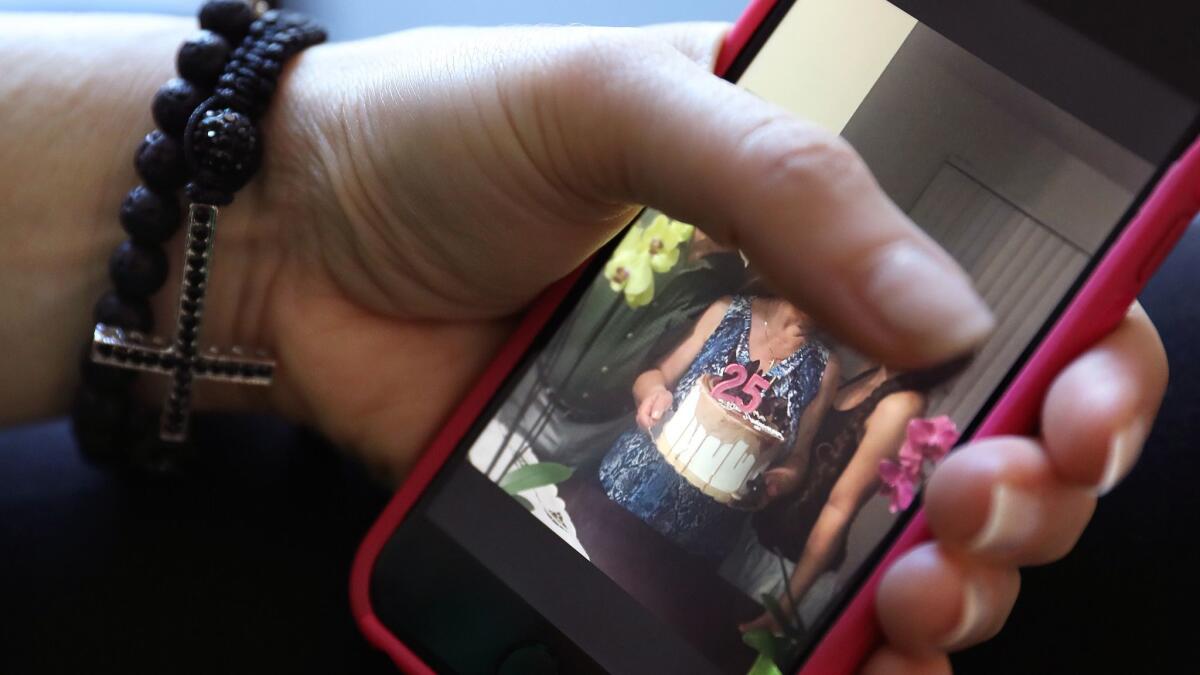After Trump administration reopens their cases, Christian refugees from Iran land in L.A.

- Share via
Nearly a dozen Iranians who had been denied asylum in the United States despite a special program for religious minorities have landed in Los Angeles after having their cases reconsidered, attorneys said.
The refugees, who sought entry under the decades-old Lautenberg-Specter program, arrived last week, said Kate Meyer, an attorney with the International Refugee Assistance Project.
Their applications were initially declined by the Trump administration last February — an unprecedented move for a program with a near-100% acceptance rate, Meyer said. In all, the cases of 87 Iranian applicants were denied.
The government did not provide a reason for the denials at the time, saying it was “a matter of discretion.”
In response, some of the refugees and their family members in the United States filed a class-action lawsuit in U.S. District Court for the Northern District of California last year. In July, a judge ruled the government must disclose individual reasons for the denials, which would allow the applicants to file an appeal. U.S. Citizenship and Immigration Services reopened the cases as a result.
“These families’ approvals really highlight the arbitrariness of the original mass denials,” Meyer said. “Without legal action and additional scrutiny of their applications, their original denials would have stood and these families would have remained in limbo in Vienna.”
The refugees learned they were accepted a few weeks ago, Meyer said. They were re-interviewed by government officials last month and were approved in late January and early February.
“Many in Vienna are still waiting for a resolution on their cases,” Meyer said. “They are still separated from their families and scared that they will face persecution if they go back to Iran.”
Applications under the Lautenberg-Specter program began stalling in late 2016.
Enacted in 1989 to facilitate resettlement of Jews from what was then the Soviet Union, the program later was expanded to include non-Muslims from Iran. Run in partnership with the Austrian government, it requires refugees to have a U.S. sponsor who will cover the costs associated with their travel as well as the typical three- to six-month stay in Vienna.
Many eventually move to California, advocates said, because the state already has large populations of Iranian and Armenian immigrants.
The U.S. Refugee Admissions Program has resettled more than 36,000 Iranian religious minorities under Lautenberg since 2001, the government said. Many of the refugees are Armenian Christians; others resettled under the program include Jews, Zoroastrians, Bahais and Mandaeans.
Although admissions from Iran to the U.S. have not completely come to a halt under the Trump administration, they have slowed from 1,061 in the first quarter of the 2017 fiscal year to 29 in the first quarter of fiscal 2018, court records show.
In court filings, according to the International Refugee Assistance Project, the government has said that enhancements to security check techniques led to the increase in denials.
The State Department said the greater number of Lautenberg denials is the result of changes to the U.S. Refugee Admissions Program made under President Obama in 2016. The increase has nothing to do with Trump’s executive orders on immigration, a department official said last year, adding that the administration “remains committed to supporting the Iranian people.”
The department said it could not “comment on the specific reason for the approvals.”
For those reunited with family, the arrivals marked a burden lifted.
One refugee who lived in Austria for 29 months spent nearly 16 of them without his parents and sister because they were allowed entry into the United States without him.
“We came together and thought we would leave together,” the 24-year-old said, speaking on the condition of anonymity, for fear of his safety. “The day that my parents left, my mother cried. I wanted to cry too, but I held it in.”
When he returned home after seeing them off, he said, he was struck by the silence that greeted him.
“I couldn’t sleep at night,” he said in Persian. “My mother wasn’t cooking in the kitchen. My father wasn’t there watching television.”
He lived with two other Iranians after his family left — one made it to Los Angeles with him, and another is still in Vienna, he said.
There were moments, he said, that it seemed like he might not see his family again. And when he heard his application was approved last month, he had a hard time believing it.
“I thought either I was dreaming or joking,” he said. “When I got to to the airport, I saw 10 or 20 people were calling my name, family I haven’t seen in 10 or 15 years. I felt dizzy thinking of who to say hi to first.”
His aunt, Goharek Garmemasihi, said she spent the last year and a half wondering when her family would be together again. Seeing her nephew walk toward her at the airport last Thursday was “one of the best days of my life,” she said. But it was tinged with sadness.
“No parents should have to go through what my brother and his wife went through,” she said.
Her nephew said he worries about the people he met in Vienna who are still waiting for word on their cases.
“Their hopes are with America,” he said. “Our final destination was America — not Austria.”
More to Read
Sign up for Essential California
The most important California stories and recommendations in your inbox every morning.
You may occasionally receive promotional content from the Los Angeles Times.











